
Vol. 1, No. 27 Published by India China Division, Air Transport Command July 19, 1945
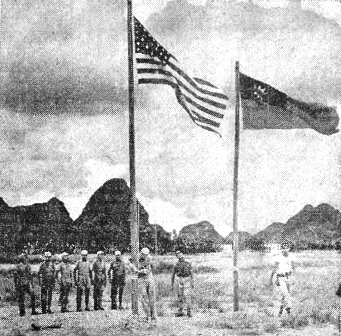 The American and Chinese flags once more fly over Liuchow after eight months of Jap occupation.
The American and Chinese flags once more fly over Liuchow after eight months of Jap occupation.
|
Of Ruthless Jap Military
As Entire Area Is Burned
Engineers Blasting Shells of Buildings in City and
Removing Mines to Protect Returning Civilians
By S/Sgt. C. A. Zellinger
Liuchow, China - Where once stood the comparatively modern city of Liuchow now lies a heap of ruins.
When the Japs left here a week ago their one thought was destruction, both to the city and the airfield. Nowhere else in China have they wrought such havoc.
There is no building wholly intact. Most of them are completely destroyed. Occasionally a wall juts up from the rubble and swings precariously in the wind. The streets are littered with bricks and other debris. Everywhere there are ashes.
Booby Traps
All over the city American engineers are blowing up what is left of buildings. Before the demolition crews came in, walls and archways had collapsed, causing some casualties. A few families who had moved into shells of houses have to be moved out and the buildings blasted before they collapse.
At unsuspected places the Japs planted mines and booby traps. The mines would cover a huge area, to kill many civilians. Over some highly explosive powder they put shrapnel and other sharp metal objects. A gadget to ignite the powder completed the mine. When it exploded the sharp metal pieces would fly through the air, seriously wounding anyone within several hundred yards. They planted this type of mine at the base of trees and other shaded spots where they thought the Chinese would gather to relax.
A few refugees have drifted back into town. They are beginning to pile bricks and collect debris to build order out of chaos. One of the few buildings still standing is the former Jap headquarters. It was well stocked with
| Ed. - Sgt. Zellinger of the Hump Express staff, was one of the first three correspondents to enter Liuchow after the Japs were chased out. Only an NANA and a Life correspondent were on the scene when he wrote this eye-witness account. |
The evacuees now returning find nothing to eat. Naked and half-naked children walk with puffed up bellies, searching for a crumb to eat.
One little fellow, not more than six years old, begged half the morning for a small cupful of rice paste. Making his way across the littered street, the weakened urchin stumbled from fatigue, his rice falling onto the ground. The boy lay there, scooping up his paste and eating it - dirt and all. Until the rice paste generated some energy in his skeleton-like body the lad was too weak to rise again.
An old man lay dead on a pile of charred bricks, his cup still in his hand. He had died of starvation and because there was no one who had the means or the time to bury him, he was dragged off to one side and left there.
The Look of Death
A hunger-crazed woman, barely able to see, recognized an American soldier's voice and rushed up to him, holding out her hands. he tried to help her but couldn't. Money, food or words could do her no good; she already had the look of death in her eyes. In a few hours she would join the dead man on the brick pile.
Such is the fate of many who return to Liuchow. What food there was, the enemy took with him. Now and then an old man or woman sits on the debris clutching the head of a burro or a pelvis bone scraped bare. These are cooked over and over again for the little food value that may be left in them.
A single herb doctor is the only Chinese medic in town. Frequently bodies are carried from his stand to the side of the street and dumped there. It's poor advertising but since he is the only doctor back, his business thrives.
Sampan Owners Lucky
Some sort of market is being built up. A typical shop - only a few are open - is spread out on the ground in an area not more than a couple of feet square. It sells rusty nails, perhaps a wrist watch without hands, a few yards of cloth and a little rice.
The only people in town who are making any kind of money are those who were fortunate enough to own a sampan. All bridges have been blown up and since the city is located on both sides of the Liu River, these sampans are kept busy transporting people across the river. A ride costs $20 CN.
Here there is no calling to Americans, no cheerful greeting. The people are bewildered when they first reach town, or what was once town. They don't even bother to look for their homes. They know the Japs destroyed them. So they look about for a wall to sleep next to and for a bit of rice to eat. The people will rebuild, since they aren't beaten - but it will take some time to collect their wits and go about the business of rebuilding Liuchow.
GI Polemen String Lines, Beat Rains
String 30 Miles of Wire in Ten Days Across Flooded Swamp
1328 BU, Misamari, Assam - Putting up a 3,800-foot telephone span across the swamp which lies between headquarters and the medical detachment in ten days of arduous work, the telephone linesmen of base communications this week won their race against the monsoons.
They had to get this particular phase of the new telephone line system finished before the torrential rains would bring the water-level in the swamp to six or eight feet.
Praises GIs
As it was, the boys had to wade through water ranging from ankle-deep to waist-deep in setting the 38 poles across the swamp. The poles, weighing from 800 to 1,200 pounds, had to be carried in by hand over distances as great as a quarter of a mile. They were set by hand, and oil drums with the ends knocked out were used for caissons.
Doing the toting were CWO Denzil Overman, T/Sgt. Sid Carter, Pfc. Anthony Meidl, Cpl. Harry O. Burns, Pfc. Wilson Dae and Pvt. Edward Gilliam, assisted by a regular crew of six coolies.
Overman was emphatic in his praise of the EM. "I've been in the Army 18 years and worked for lots of telephone companies in my time, but never have I seen such spirit and tenacity as that displayed by these men," said the rugged chief.
Under Runway
Burns, Dae and Gilliam had never climbed a pole before, but with only 20 more miles of line to string (about six to eight days' work) the men have completed almost the whole project without a serious accident.
Highlight in the swamp operation was the brush with quicksand. The last four holes dug caused cave-ins below the 14-inch level. As the men removed the dirt, the sides caved in continually until they found themselves standing on a 14-inch crust of earth. They had to carry in 32,000 pounds of rock in boxes to make a firm foundation for the poles.
There are 30 miles of wire in the swamp circuit alone. The whole 120-mile wiring project was started last April. Another achievement was the laying of 1,500 feet of cable under the runway without interrupting operations a minute. The boys worked 14 hours a day on this part of the job.
Yanks in Nanning Helping 'Pop' Get Back in Business
Nanning, China - In downtown Nanning "Pop" is once more back in business.
Before the Japs captured Nanning, Pop's place was a favorite of every American GI stationed there. But when Pop came back a few weeks ago he found his former business place razed by fire and reeking of Jap filth.
Pop got busy and cleaned up the joint. But his stock of food and drinks was confiscated.
Some of the handful of Americans who are now at Nanning were there before and had told others about Pop's place.
Go the GIs did everything they could to replenish Pop's stock. If they heard where there was some liquor they told him about it. The same was true of foodstuffs, glasses and furniture.
Today Pop is back in business. Of course, he had to set up shop upstairs while he is repairing the ground floor. But he's got the same old smile. He stands on the sidewalk and greets soldiers who infrequently pass by. He tells them that he's open and that he's got hamburgers, beer and Chinese dishes.
Many Mines In Liuchow
50 Chinese, 3 GIs Killed In Attempt To Unarm Para-Frag
Liuchow, China - U.S. engineers encountered the heaviest concentration of mines they ever ran into in China, when they came into Liuchow.
The Japs had dug holes throughout the city, in runways and taxi strips and mined the loose dirt around the pit.
Para-Frag Explodes
They used various types of mines - some Chinese, some German Tellers and even some of their own. Mostly they used U.S. para-frags which had been left behind when the Army moved out last November.
Few casualties have resulted from the long and dangerous hours the Japs must have spent in planting the mines. To date, two coolies and one Chinese soldier have lost their lives when they stepped on the mines. No equipment has been lost.
More than 50 Chinese soldiers and three Americans were killed when a para-frag that was being used for demonstration purposes exploded.
53 Mounds
An American captain in the U.S. Chinese Combat command was demonstrating to a group of Chinese soldiers how to unarm one of the para-frags that littered the ground. While he was in the process, it exploded and two enlisted men, the captain, and the Chinese soldiers witnessing the demonstration were killed. One American who had been off to one side escaped with injuries.
Fifty-three mounds with the names of the soldiers inscribed on a small board at the head of each grave bear testimony to the tragic accident - and give grave warning to any who might fool with explosives they know little about.
Nay Morphine, Buddie, Make It Bahoot Whisky !
1330 BU, Jorhat, Assam - "I don't want a shot of morphine, give me a shot of whisky, straight and bahoot," insisted S/Sgt. John W. Stalley, of Springfield, Ill., to awed medics.
Sgt. Stalley, aerial engineer here, was given the order to bail out recently when his plane rapidly lost altitude. he kicked open the cargo door, and sent the radio operator out first. Then, with only 200 feet between the crippled plane and the ground, he jumped. A split second after his 'chute opened, the hardy sergeant landed in the jungle, narrowly missing a clump of bamboo trees.
The sergeant's only injury was a bruise received when he kicked open the door.
Only One Thing To Do, Start Using That Pencil
1350 BU, Kunming - This is an oddity and an oldie, but it really happened here recently. T/Sgt. Maurice A. Wilson, sergeant-major, frantically dialed the dispensary, requesting that an ambulance be sent over immediately.
"My correspondence clerk, Pvt. George Smith," he exclaimed excitedly, "just swallowed his fountain pen!" Sgt. R. Barnett, a medic, replied sympathetically: "That's terrible! I'll send someone down immediately. What're you doing in the meantime?"
Wilson: "Using a pencil."
Bengal Isn't So Terrible - Or Is It ?
There Are A Few Who Still Like India After Week
By Pvt. Ve' Grable
Hq., Calcutta - I've only been in India two weeks, but two-year GIs are already looking at me a bit queerly. Can I help it if I like the place?
I'm learning fast, however, and now when a haggard ICDer staggers up to me in the Snort club here (the stagger, I'm told, resulting from the hard and lonely life) and asks what I think about India, I pull a long face and skip the merits for Baksheeshland's limitations. Then I listen to a 60-minute dissertation on what's really wrong with India.
The I-B boys have got something, though. There's nothing like the States. Gee, those chocolate milk shakes, Chicago's super subways, the Zanzibar in Times Square, watching the ships come in at Boston harbor, fresh fruit, and a night at Abe and Pappy's at Dallas. Those and all the rest are still there, because I saw them two weeks ago, and I'm convinced they'll be the same when I go home. Meanwhile, I'm going to enjoy India, because it's got something, too.
Burning Ghats
While I've found that 24-month GIs are, relatively speaking, just about like all other humans, the rest of the population is a little unusual. That's what I like - that and the fact that India isn't as bad as it's painted in the States.
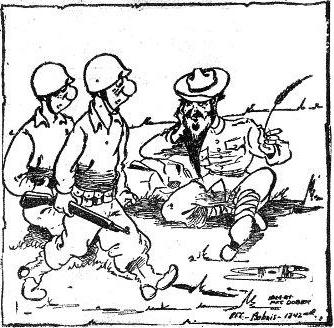 "Ah! Replacements."
"Ah! Replacements."
|
The majority of the ATC boys seem to think Karachi's a better deal than Calcutta, but I disagree. I was there two days, and I made up my mind that a little rain and extra heat were worth giving dust, wind and sand the blitz. I haven't been sorry yet, and so far living and working in an old jute mill hasn't lost its interest (Ed.-It will, sister!)
As I have said India's different; that was my first impression, but veteran GIs maintain it won't be my last. I haven't picked up enough words from my Hindustani book yet to ask the Indians why they dress as they do, but no doubt they have their reasons. I see great possibilities in the saree, however, and plan to take one home and give it a modern twist.
Catching On
Driving on the left side of the road was a little startling at first, but when the finer points of the burning ghats and rivers with floating bodies are considered, that ain't nuthin'.
It was almost worth coming over just to get out of wearing a hat, and wait till I write the WACs back home that hair ribbons are authorized! The language the Indians speak so fluently is a little difficult yet, and I felt rather foolish the other day when I made a purchase and asked the post tailor how many "ayahs" he wanted. It was a relief then to discover that the Indians have a sense of humor, too.
So I think India is OK. And if I can only skirt the Assam weather hair problem, I feel I'll go home thinking so. Provided, of course, I make it under that forbidding two-year mark. As I said, I'm catching on fast.
CAA Class Trains Men For Postwar
GIs Can Acquire Licenses To Continue Service Trades After War
1346 BU, Tezgaon, India - A Civil Aeronautics Administration school for the training of mechanics, engineers, instrument specialists and weather observers will be started at this base within the month, it is announced by Capt. Carl N. Hoerr, information and education officer.
The school will acquaint Army technicians with the regulations and requirements necessary for them to carry their service trades into civil life.
"Rather than have these men waste valuable time getting CAA licenses after discharge, they will return to civil life with their certificates under their arms," said Hoerr.
Initial plans for the school were laid over a month ago. The idea has received the sanction of ICD and also of ATC Hq. in Washington. ATC officials conferred with CAA and said the idea had been "favorably received."
Washington also has asked for further information concerning the school and voiced a desire to install similar training programs in the other divisions within the command.
It is expected that CAA will send representatives to the India-Burma Theater to administer the necessary tests to the men taking the course.
All classes are scheduled during off-duty time and are open to both officers and enlisted men. Teachers of the various courses hold CAA licenses.
Courses in tower operation, parachute rigging and packing and the many other phases of civil aeronautics will be started when enrollment figures warrant.
Salvaged airplanes of the lighter type, L-1, L-5, PT-17 and PT-19, plus several different type small engines, have been received and will be set up for class work.
Pvt. Breger
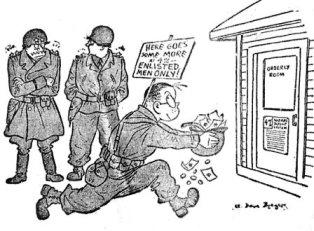 "He never saved a nickel till he found out that officers aren't entitled to use the Soldiers Deposit System."
"He never saved a nickel till he found out that officers aren't entitled to use the Soldiers Deposit System."
|
HOLD THE WIRE...
Two Chinese were caught the other day and arrested for stealing wire from U.S. Army telephone lines. One of the jokers had about 3,000 feet of wire that had been clipped from the poles.
What a line !
LOTS OF DOPE...
Officials in Chengtu burned 8,600 ounces (over a quarter of a ton) of opium the other day at a public bonfire. It was part of the observance of the Opium Prohibition anniversary. Opium was a fast-fading vice in China, before the Japanese flooded the country with the stuff during the last eight years of invasion.
This reminds one that the Japanese fight not only with guns and planes but with everything they have; and that they have even planned to weaken future people of China. This would make the Chinese an easy target in case there ever is an urge to repeat their "Just for Japs" campaign.
TWO FACED...
More quotes from rice-writers. "Ever since his evacuation from Hong Kong, he has lived a miserable life there."
How could he be so mean to he? Or maybe it was the half of him he left behind.
LEERS FOR LIN...
Some good citizens of China have uncovered the fact that while Lin Yu-tang (contemporary writer and lecturer) has professed to be a representative of the common people, his passport lists him as a "Chinese diplomatic official."
Their only comment was, "Why worry? Now that his true nature is known, what else can he sell after having already sold 'My Country and My People'?"
STAY ON THE RIGHT SIDE...
Guys that have finally grown used to driving on the wrong (left) side of the road in China may soon have to go back to driving on the right (right) side. The question is, "Will they have as much trouble changing back as they had changing over?"
It seems that Gen. "Slash" Wedemeyer has proposed another slash in the situation, Chinaside. This time it's changing the custom of driving on the left side back to the right side.
When that happens everything will be on the "right" side for the many GI vehicles that are speeding up and down the (sometimes) muddy, (sometimes) dusty (but never good) roads of China's supply arteries.
SICK, SICK CALL...
According to reports, the hospitals-for-veterans situation in China is about as rotten as ours back in the States. The same shortages, same maltreatment has been uncovered. It is hard to believe any country would allow anyone to mistreat those to whom they owe so much.
China, at least, has an excuse because of their shortages and other unsettled conditions.
SCENE AROUND CHINA...
An old beggar holding an empty food can labeled "US Army" stands in front of a big restaurant asking for food. A GI takes pity on him and throws him some money.
A young Chinese lover, all set to go a-courtin', buys ten bars of U.S. Army chocolate as a present to his girlfriend.
On meatless days a housewife opens two GI cans of corned beef to serve for her hubbie's evening meal.
(In commenting on these things a Chinese paper said, "If you still feel it (the subject) is too dark, perhaps you would require a stick of U.S. Army matches to give you a little light (on the subject)."
But then, the U.S. has been a "Sugarland" to many European countries. Why not help the Chinese... as long as our men get enough and palatable food to keep them healthy and happy?
The food situation is another thing. It is finally starting to improve, but for quite a while the men in China had to eat stuff that was not quite "appetizing" because of various deals which kept U.S. men from eating U.S. food. That ain't good.
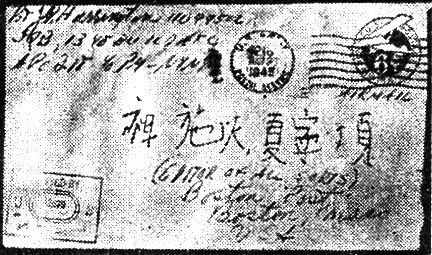
|

Editor:
Perhaps you would be interested in this pix of the envelope of a letter which I received a couple of weeks ago from my son, Pvt. Joseph P. Harrington, a radio operator at the 1348 BU. We are reproducing it in a service paper we get out here. I have written a daily newspaper column here for ten years and have been called many things, but it remained for a member of the family to do it in Chinese.
I should also like to congratulate you on the swell job you and your staff are doing with "Hump Express." I see a large number of newspapers put out by service men in all parts of the world, and for clean, professional copy and format your sheet tops them all. Good luck to you.
Sincerely, Joe Harrington, "All Sorts" Column, The Boston Post
CCC GIs Crave Friendship After Fighting for Liuchow
Liuchow, China - An American infantryman sat in the shade of a crumpled wall and looked around him.
Suddenly he spotted another American GI just crossing the river in a sampan. The infantryman jumped to his feet and made his way to the bank of the river, to meet the approaching GI.
"Boy, am I glad to see you guys," were the first words the foot soldier said.
Look Around
When Liuchow was taken, a few of the Americans with the U.S. Chinese Combat command got their first short rest in a long time. They also met the first outside Americans they had seen in a long time.
The newly arrived GI wanted to look around town. The foot soldier accompanied him. Everywhere they went the infantryman checked for mines. He had someone to talk to now and no mine was going to spoil things, he said.
On to Kweilin
As he went he met many of his friends in the Chinese Army. He had a bright remark for every one. Most of them asked him when they would arrive in Kweilin and he told them it depended on how soon the rations were gathered together.
"For a long time I've been traveling with these Chinese soldiers and they were all looking forward to the day when they would enter Liuchow. Now just look at it," he said solemnly. "There's nothing here, so they want to go to Kweilin."
For two years this man had been fighting. He got to know the Chinese by living and fighting with them and now he felt sorry for them.
Most Welcome Sight
But he also thought of going home.
"I had a friend who was ripe for rotation and he got jittery. One day he didn't come back when he went up to the front. It's got me worried," he said.
This handful of Americans who fight with the Chinese have been in Burma and now they are slogging their way through China. Many wear the Purple Heart. Most of them are extremely lonely. Only when they reach a place such as Liuchow where other Americans come in promptly do they get a chance to talk to buddies in their own army.
"Our most welcome sight," he said, "is the transports that come over periodically and drop rations to us. Without those boys we couldn't keep going."
Old Stunt Fools GIs into Buying A Quart of Wine
1350 BU, Kunming - It was Barnum who said, "There's a sucker born every minute," but after a recent episode here, GIs feel they're one up on the philosopher with their new slogan, "There's a GI stuck every 15 seconds." Here's the story:
Sgt. C. J. Crader, of Alton, Ill., and Pvt. J. Compton, of Milwaukee, Wis., were roaming the streets when they were stopped by a well-dressed Chinese youngster who offered them a bottle of genuine PM whisky, straight from Uncle Sugar.
"Only $10," the lad asked, explaining that he could afford to be generous and give the Americans a real bargain since the bottle had been given to him by a CNAC pilot.
The price was far below "black market" standards, and the seal was unbroken, too. It didn't take the GIs long to realize that this was a bargain indeed, so the deal was closed. Then Sgt. Crader and Pvt. Compton made a bee-line for their barracks, to take a drink of the choice liquor.
They opened the bottle, and everyone's mouth watered. They tasted the liquor, and everyone's face grew green with envy - everyone's except the two GIs' because it wasn't whisky, but rice wine tinted to resemble whisky!
The Chinese lad had found two more suckers for the well-known, but rarely detected, trick of cutting out the bottom of the bottle and substituting.
Photographers Stay On The Beaten Path After Mines Explode
Liuchow, China - In this area are a group of photographers who feel extremely lucky.
When the Japs left, the first Americans into the town were photographers from the 14th AAF and the Signal Corps.
The 14th AAF photographer came down the road on a motorcycle. The Signal Corps men brought their own jeep. They roamed all over, taking pictures and recording facts.
A little later the engineers came in, The photographers stood around amazed and a trifle frightened when they observed demolition crews go to work detonating mines - some in the very areas the shutter bugs had driven through.
From then on the photographers stayed closer to the engineers.
GI 'Good Samaritan' Does Chaplain Duties
1326 BU, Lalmanir Hat, India - A sweat-stained, fatigue-clad GI counterpart of the biblical Good Samaritan is Sgt. Harley O. Benthin, aircraft mechanic at this base.
For the past year Sgt. Benthin has visited patients at the base sickbay and prisoners in the guardhouse, following the completion of his days' stint at the hangar. Besides bringing words of cheer, the Pierre, S.D., sergeant also brings PX supplies and mail.
To say that Benthin's postwar plans are unusual would smack of understatement. He plans (1) to become a minister and (2) to return to India as a missionary.
Clever Jap Trick Has Pilots Strafing Their Own Planes
Liuchow, China - Since the recapture of Liuchow airbase the 14th AAF has had to rub out a few figures on the destruction of Jap planes on the ground.
When the Americans evacuated the base last November some of the fighters and heavier planes were left behind because they were not in commission.
After the Japs moved into the area they dragged out the damaged P-51s and other planes and tagged them with the rising sun. Partially hidden by foliage, these planes looked exactly like several of Japanese manufacture.
Fourteenth Air Force fighters strafing the area would come in close and shoot up these clever dummies. The next day the Japs would drag them to another area, fix them up and once more the decoy would be shot up by the 14th. So cleverly did the Japs set up these dummies that it wasn't until considerable ammunition had been expended that the 14th realized it was destroying its own planes.
Nanning's Population Returning from Hills to Reconstruct City
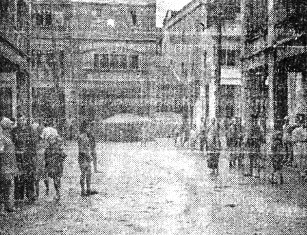 WARTIME PLAYHOUSES - Chinese youngsters use Jap pill boxes for playhouses.
WARTIME PLAYHOUSES - Chinese youngsters use Jap pill boxes for playhouses.
|
By S/Sgt. C. A. Zellinger Photos By M/Sgt. Jack Glasco
Nanning, China - Last fall, before the Japanese captured Nanning, its population was listed at 30,000. Today a fairly accurate estimate puts the figure at 15,000.
Tomorrow this figure will be higher as the people come out of the hills, paddle down the river, or arrive by ox cart from free cities. Of course there are those who will never come back; those who died on the long, wearisome almost foodless treks from this city; those who perished at the hands of the Japs before they could leave. They were all harmless people, living off the earth and minding their own business.
It is difficult to gain information in Nanning. Those few educated people who did stay during the occupation are reluctant to admit it and are looked down upon by many who are now returning.
Liberated Peoples
Those who do come back are willing to talk, but know little of the actual happenings in the city during the winter and spring.
"Before the enemy came, we had three big stores. Now we have nothing," complained a partner of one of the first businesses to open its doors in Nanning.
Such stories are related time after time to the GIs who like to listen to the talk of these liberated peoples.
Of course, some of the stories are not true. These are the sharpsters who made money under the occupation and intend to go on doing so by playing on the sympathy of the GIs.
Sidewalk Sitters
But most of them are true. For weeks people have been streaming into town via the roads that lead from the hills and other unoccupied villages.
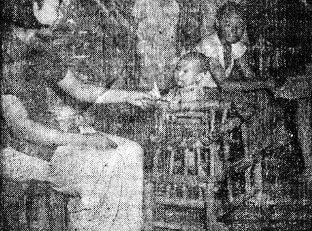 CHINESE INGENUITY - At Poseh a father built this contraption for his son.
CHINESE INGENUITY - At Poseh a father built this contraption for his son.
|
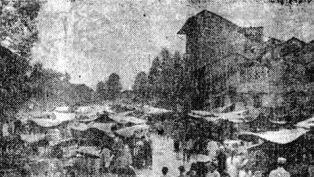 SLIM RATIONS - The little food in markets is snatched up eagerly.
SLIM RATIONS - The little food in markets is snatched up eagerly.
|
Many come back to find their homes burned, their businesses wiped out. The Japs looted and ransacked every establishment in town during their stay. But the Chinese people are moving into the wide streets of Nanning, some picking up where they left off, and in most cases starting all over again.
It is a common sight to see a man with his wife and baby sitting behind a meager display of merchandise that had been hoarded. While they get along as best they can with these sidewalk shops - probably no more than three feet square - the building behind them is being repaired. When the Chinese have been here for a year, Nanning will be a remodeled city with modern shops, hotels and theaters.
Not Street Vendors
The women of the house go around conversing with other street shopkeepers. They discuss their own particular difficulties and comment on the display and quantity of merchandise for sale in another's store. These people are not street vendors. They have been forced to move to the streets until the stench of the Japs can be fumigated from their shops.
There are no civilian automobiles in Nanning. Occasionally a jeep sputters down the handsome pavement but otherwise everything goes on foot. carts too are practically non-existent. Men, women and boys carry their future homes on their shoulders, piece by piece, as they chat happily about the manner in which they will live now.
Already there is a
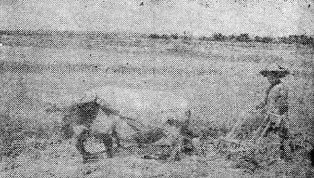 FOR WHOM THE BULL PULLS - The old lady and her bull till a rice paddy.
FOR WHOM THE BULL PULLS - The old lady and her bull till a rice paddy.
|
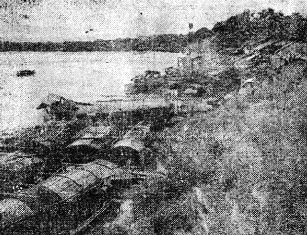 SAMPAN VILLAGE - Shabby barges provide an atmosphere of gaiety.
SAMPAN VILLAGE - Shabby barges provide an atmosphere of gaiety.
|
Shy Youngsters
Those who stayed in Nanning did not acquiesce completely to the rule of the Japs. All over town there are signs, painted in a sickly blood color, depicting enemy atrocities. The most popular sport of the Japs was raping Chinese women. They would find some comely girl who was happily married, burn her home - and probably her husband - and make off with the girl. Whatever became of such women, no one in Nanning knows. They have not been heard of since.
Children at first were shy when approaching a soldier. They would shout and then watch the reaction. If favorable, they would make attempts at conversation which go about as far as "Ding hao" and "Okay." The latter they had learned when the 14th Air Force was here before.
Even now when one turns quickly to catch a glimpse of a little urchin tugging at a trouser leg, the child will scamper off in fear and bide his time in returning. The Jap soldiers evidently were no kinder to the children then to their elders.
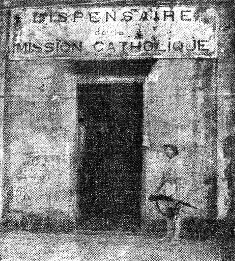 POLICE HEADQUARTERS - Police give orders from former mission hospital.
POLICE HEADQUARTERS - Police give orders from former mission hospital.
|
Stole Pigs
One aged man gladly posed for a picture, boasting that he had never feared the Japs would not be driven from his home. He had walked miles and miles to keep away from the stinkers, and would do it again despite his age, he claimed.
One woman, too old to leave the city's edge where she lived all he life, points to a scrub of a pig when asked how the Japs treated her. She counts to 15 on her fingers indicating the Japs got 14 and left her the runt. But she shrugs her shoulders and motions that the pig is pregnant and, if she is lucky, will have 15 pigs again in a couple of years.
A once well-to-do businessman in Nanning now has a small establishment where he proudly displays a few bottles of beer and a few packs of cigarets. He is about the best stocked store in town. He carefully asks and writes down the name and hometown of every GI who visits his place.
Occasionally he finds some GI from the same town as a former 14th Air Force man who frequented his establishment last summer. He inquires about his friends and asks if anyone knows the whereabouts of these men. He says he would like to write them and let them know he has returned and is back in business again.
Old Charlie
Nanning is still rather empty but it is filling up and being rebuilt with all the vigor of a people who once again are free. The sampan village is the first to return to normal life - not having to rebuild but merely float down the river and moor outside their old hometown.
GIs talk of the eat-shop that old Charlie is building and what he will have on his menu, of the faces they remember among those who return, and of the faces they miss, or business establishments they no longer can frequent. But one by one their old friends are coming back and one by one they are rebuilding and remodeling their shops so that Nanning will rate among China's newest cities.
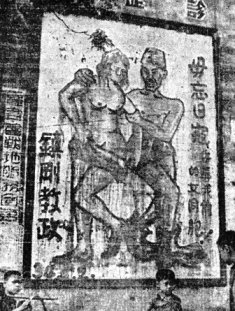 GRUESOME REMINDER - This ghastly blood-red sign recalls the Japs' sport - raping Chinese women.
GRUESOME REMINDER - This ghastly blood-red sign recalls the Japs' sport - raping Chinese women.
|
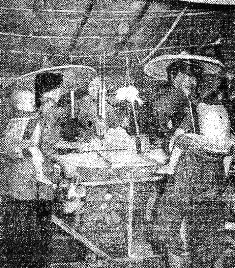 DAILY BREAD - Two women sell fruit for money to buy other food for the day.
DAILY BREAD - Two women sell fruit for money to buy other food for the day.
|
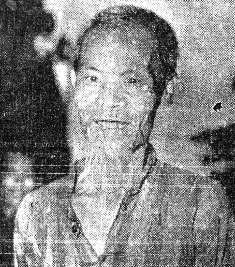 OLD MAN OF NANNING - He says he would walk across China to elude Japs.
OLD MAN OF NANNING - He says he would walk across China to elude Japs.
|
Men Shatter Base Marks During June
Bengal and Valley Stations Set New Records But Myitkyina Slips
1346 BU, Tezgaon, India - For the second consecutive month, Sgt. D. A. Reichen's crew of mechanics won the prize for getting the most operational hours out of their planes.
During May, Crew Chief Reichen and his men kept their C-54 Douglas Skymaster in the air for 378 hours, while for the month of June, they topped their own mark with a high of 396 hours.
Sgt. Reichen is assisted by S/Sgt. W. Wilson, of Lincoln, Neb.; Sgt. J. D. Anderson, of Nacogdoches, Tex.; Cpl. Bill Graham, of Providence, R.I.; Pfc. K. K. Keith, of Tyler, Tex., and Pfc. R. L. Blair, of Lexington, Okla.
1348 BU, Myitkyina, Burma - Long the holder of one of the lowest accident records in ICD, this base recently went 62 days before a minor mishap spoiled a perfect record.
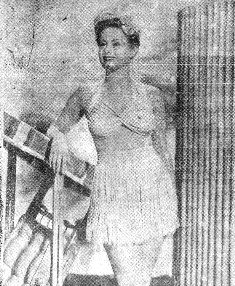
|
Operating on a full flying schedule, which included movement of the Mars Task Force, personnel saw their record fall when a taxiing C-47 scraped the nose of a C-109.
In the past 90 days, only three accidents have occurred to homebased aircraft here. All were minor, and none resulted in injury to personnel.
1330 BU, Jorhat, Assam - Maj. Edward F. Cook, director of aircraft maintenance, has announced a new record established by Flagship No. 294, a C-87, and its crew: 354 hours and 50 minutes flying time for June.
The previous base record, established in January by aircraft No. 267, was 341 hours and 20 minutes. The new record represents a distance flown of approximately 56,773 miles, or two and a fourth times around the world, in 30 days.
Men assigned to the aircraft during June were Sgt. William S. Brown, crew chief; Cpl. Julius J. Zientek, assistant crew chief; S/Sgt. Arthur J. Poole, S/Sgt. George E. Desserres and Cpl. Clarence Evers, aerial engineers, and Cpl. Arlie J. Clark and Pfc. John G. Yocom, mechanics.
1337 BU, Sookerating, Assam - When base statistical control totaled its figures for the month of June, previous records established in 31-day January were found bested in every detail by the 30-day month.
Principal item was the setting of a new theater trip and tonnage record in June.
Gasoline consumed would have fueled 10,650 automobiles on trips from California to New York, at a cost of 145,379 war bonds retailing at $18.75 each.
Dr. Soong Buys Present for Clerk
1304 BU, Barrackpore - Pvt. Joseph F. Brisebois is sporting a lacquer cigaret set presented to him by Dr. T. V. Soong. The token of appreciation for Brisebois' solicitous service, during a recent trip "from here to there," was forwarded to the flight clerk by the consul general here at Dr. Soong's request. A letter of thanks accompanied it.

|

|


Lead-Eating Bugs Damage Phone Wires
Bugs Were Never Seen But Tiny Holes Prove They Exist
Hq., Calcutta - Japs, monsoons and the Hump have a brilliant successor as plagues of the ICD. His name is (till a better one is found) the lead-bug.
When communications engineers of the division first planned the vast network of telephone communications now linking its bases, they decided against putting too many cables underground. It was thought that lines suspended from specially treated poles would not tempt insects nor invite undue monsoon dampness.
Holes in Line
Of late, however, communications fell under a spell of constant interruption. Harassed crews, following indications of electrical instruments, often arrived at the scene of the break only to find the line to all intents and purposes intact. Closer scrutiny revealed numerous holes, one-sixteenth of an inch in diameter, in the lead sheathing which protects the suspended cable.
These holes, admitting moisture, raised hell with the phone system.
Aerial Enemies
The suggestion that any process other than insect attack has caused the conditions is discounted by Maj. Manuel Fernandez, division communications officer. Thus the existence of the pernicious bug has official sanction.
No one has yet caught the ravenous creatures at work, but one thing is indicated, that they are aerial enemies, because in each case the sections attacked have been away from the supporting poles.
Rains Spell Doom To Exchange Walls
1311 BU, Gaya, India - Heavy rains which soaked plaster out of brick walls in the post exchange caused its collapse here early this week.
Twenty minutes after the PX opened at 10 a.m., several student officers and four enlisted men who were in the building noticed a crack begin to appear near the ceiling. in a few minutes the entire wall had fallen eight inches away from the ceiling and the exchange was evacuated and closed.
Fire Talks Back to 1305 Safety Wallah
1305 BU, India - The ground safety NCO here is trying to live one down that is giving the boys no end of amusement.
Sgt. Leland H. White, during a demonstration showing the need for precautionary measures in handling highly volatile fuel during warm weather, momentarily forgot that his demonstration ground was hot from a previous fire.
The sergeant started to build another blaze by pouring gasoline on a cleared space. The gasoline flashed, and White's hand was singed.
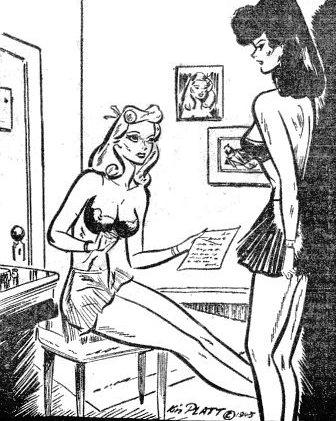 "He wants to know if I've got anything on for tonight!"
"He wants to know if I've got anything on for tonight!"
|
If You Want to Become a "$%&? - Here Are the Rules
The editor of the Misamari base's weekly paper, after having suffered at various times in his Army career from the type of "courtesy" known to that small group of GIs which makes the word "gentleman" the exclusive property of officers, passes on a few of that minority's rules of etiquette.
Knowing that there are members of this minority at every base and that they have members from all ranks - master sergeant to private - these rules are being passed along.
Here are the rules:
"Save as many theater seats as possible - preferably a whole row.
"If the generator goes out while the movie is on, be sure to curse the projectionist and then if the sound goes faulty owing to a bad sound track, curse the projectionist the second time.
"If someone asks you to pass an article in the mess hall, pretend you do not hear. Save yourself a lot of unnecessary exertion.
"When (not if) you get slightly inebriated be sure you come through the area where men are sleeping, about 2300, singing at the top of your voice.
"Always talk loud after the other men are asleep. They are probably getting too much sleep anyway. If you forget to talk loud at night, or don't keep them awake long enough, start loud talk early in the morning."
If you carry out these rules, and there are FAR too many who do, you will be a member in good standing of that exclusive little group of "$%&? who make life miserable for everybody else.
HUMP EXPRESS is the official newspaper of the India-China Division, Air Transport Command, APO 192, c/o Postmaster, New York, N.Y., and is published by its Public Relations office. Camp Newspaper Service and Army Newspaper Service features are used, reproduction of which is prohibited without permission of CNS and ANS, 205 East 42nd St., New York, 17, N.Y. Other material is submitted by staff members, ICD-ATC base Public Relations sections and other soldier correspondents. Printed weekly by the Hindusthan Standard, 3 Burman St., Calcutta, India, and distributed each Thursday. Passed by U.S. Press Censor for mailing.
| Military transport schedules over India for cargo, personnel and mail . . . maximum tonnage of essential war materials over the Hump . . . movement of troops and supplies in support of tactical operations in China . . . evacuation of the sick and wounded - these are the missions of ICD-ATC. |

JULY 19, 1945
Original issue of HUMP EXPRESS shared by CBI veteran Steven C. King, author of Flying the Hump to China.
Copyright © 2007 Carl Warren Weidenburner
TOP OF PAGE PRINT THIS PAGE ABOUT THIS PAGE E-MAIL YOUR COMMENTS
PREVIOUS ISSUE HUMP EXPRESS BASE NEXT ISSUE